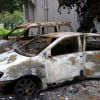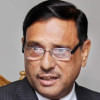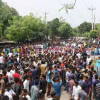Quota in Govt Jobs: Sought reform, got abolition

Prime Minister Sheikh Hasina yesterday announced scrapping of the quota system in public service recruitments, and asked students to return to classes ending demonstrations over the demand for quota reforms.
"The quota system stands scrapped to stop repeated sufferings [of people] and avoid hassles of tackling movement time and again. This is clear," she said in parliament in response to a supplementary question.
"For the last several days, classes and studies have been suspended at all universities. There was an attack on the residence of the VC [of Dhaka University]. There is traffic jam on roads... people are suffering. Why will general people suffer repeatedly?
“If we go for reforms [of the quota system], another group will come up after a few days and say 'we want further reforms'. This issue will keep coming if the quota system remains. But if it ceases to exist, there will be no problem. So, there's no need for having the quota system."
The PM, however, said a different arrangement will be made so that members of ethnic minorities and physically-challenged people can get government jobs. "They will also be able to join."
“The students have protested enough, and we now want them to return to their classes," the PM noted.
Her statement comes amid countrywide demonstrations of students of public and private universities for reforms of the quota system. The protesters blocked key points in the capital and also roads and highways elsewhere over the last four days.
Soon after the PM's announcement, the agitating students called off their protests for yesterday, and said they will come up with a decision on their movement today after examining various aspects of her speech.
Rashed Khan, joint convener of the protesters' platform Bangladesh General Students' Rights Protection Forum, said they will hold discussions among themselves to decide on the next course of action.
Earlier around noon, the leaders of the platform told reporters that they expected the PM to speak on the quota issue.
"We don't want abolition of the quota system. We want reform as there is a need for it," Rashed said.
The quota system was introduced through an executive order in 1972 and was amended several times. Currently, 44 percent are recruited on merit and 56 percent under various quotas.
Of the 56 percent, 30 percent is kept for freedom fighters' children and grandchildren, 10 percent for women, 10 percent for people of districts lagging behind, 5 percent for members of indigenous communities, and one percent for physically-challenged people.
Since 1972, several public service reform committees and the Public Service Commission, the body that oversees government recruitment, objected to the policy.

However, subsequent governments paid no heed to the suggestions for making room for more efficient people in bureaucracy by reforming the quota structure, leading to anger among the youths in the midst of a slowing job market.
Referring to Monday's meeting between Road Transport and Bridges Minister Obaidul Quader and protesters' representatives, the PM yesterday said a specific date came up [for postponement of the agitation] at the meeting. The cabinet secretary was given the responsibility to look into the issue.
But the agitators did not accept it and took to the streets, she said.
Hasina also said it was unfortunate that she had to witness the movement on quota reforms.
"What is the movement all about? Is it about suspending studies and sitting on the streets or stopping vehicular movement on roads? Even patients cannot go to hospital... people cannot go to their workplaces."
The premier said it was her government that built "Digital Bangladesh", but modern technology is now being used to spread rumours instead of constructive activities.
"A youth suffered wounds in the head, and suddenly a person gave a status [on the Facebook] that the youth died. Immediately, students came out [of the halls]."
Female students broke gates of dormitories and came out on the street at 1:00am on the basis of a rumour, she said.
"Who would take the responsibility if any untoward incident had taken place?"
Strongly condemning the attack on the DU VC's residence, the premier vowed to bring to book the perpetrators of vandalism and looting.
She said intelligence agencies have been directed to investigate the incident, and said her government cannot tolerate such a big offence.
"We want cooperation of teachers and students to this end."
One cannot have real education by insulting teachers and elders. The person may obtain a certificate, not true education, said Hasina.
The PM further said the photographs of the attack on the VC's house reminded her of vandalism at her house at Dhanmondi 32 by the Pakistan occupation forces in 1971.
The attack on VC's house was carried out in a planned way, and those who did it cannot be university students. "This is because no student can insult his or her teacher this way," she said.
"Students have to find out who ransacked and looted the VC's house and where the looted goods are ... those who were involved in it must be brought to justice."
Hasina further said the government started working soon after the students raised their demands.
The issue was discussed at a cabinet meeting and Obaidul Quader was given the task of holding discussions with the students. Accordingly, he held talks with them, said Hasina.
She had also asked the cabinet secretary to look into the matter and have discussions with all concerned.
"Many students accepted it and many didn't... many students stayed at the TSC for the entire night. Why? When discussions were underway, what was the justification for continuing the movement," she asked.
The PM said students vandalised and burnt materials prepared for the "Mangal Shobhajatra", a Unesco heritage, and asked, "Why students will indulge in such destructive acts.”
Hasina also said she couldn't sleep the whole night after seeing female students come out of their dormitories late at night.
"I made phone calls repeatedly and sent Nanak [Awami League lawmaker Jahangir Kabir Nanak] along with Chhatra League president and secretary [to Shahbagh]. They went to the spot and had talks with the students."
They also talked to the press about the outcome of the discussions. Yet the students accepted nothing and continued demonstrations. And even students outside the capital took to the streets, she said.
"This not the first time the demand for reform of the quota system has come up. This demand was raised several times in the past."
She said her government was fully aware of the students' wellbeing.
The quota system has been there since 1972 and it was reformed several times.
"Whenever quota-based posts fall vacant, we always fill those [with candidates] from the merit list," the PM said, giving examples of recruitment based on merit in the 33rd, 35th and 36th BCS examinations.
One of the protesters' demands was that candidates from the merit list be recruited in quota-based vacant posts. "This is being done now," she said.
It was frustrating that some teachers of the DU and Shahjalal University of Science and Technology gave views similar to that of the agitating students, mentioned the premier.
On participation of female students in demonstrations, Hasina noted, "I assume that they also don't want quota [for women]... representatives of female students were there at the meeting with Obaidul Quader.
"During the discussions, they [the representatives] said they will get jobs through tests... it's a good statement and I'm very happy. As they don't want quota, what is the necessity of it ... There is no need for this system," she said.
Hasina, however, said the government would arrange jobs for physically-challenged people and members of ethnic minorities following abolition of the quota system.

 For all latest news, follow The Daily Star's Google News channel.
For all latest news, follow The Daily Star's Google News channel. 







Comments